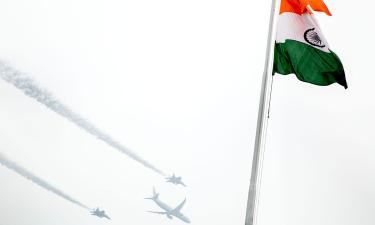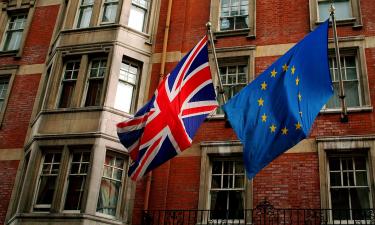Korean Crisis: A Repetition of The Iraqi Crisis Without War
 The present which the North Korean authorities made to themselves on September 9, the 55th anniversary of the establishment of the Democratic People's Republic of Korea, was announced in advance, so that the world waited for it with aloof confidence.
The present which the North Korean authorities made to themselves on September 9, the 55th anniversary of the establishment of the Democratic People's Republic of Korea, was announced in advance, so that the world waited for it with aloof confidence.
In fact, aloof confidence is characteristic for absolutely all participants in the Korean crisis and can be seen in all of their old and new statements. Everyone knew from the start that if North Korea decides to blow up a nuclear bomb or show or launch a new ballistic missile, it would surely do it. But this would not greatly affect the crisis itself. Yes, there would be negotiations, with scandals, fireworks and lengthy timeouts, and with the refusal of Pyongyang or Washington to attend them. One way or another, but negotiations would be held.
The thing is not only that all participants in the talks (Russia, the USA, China, Japan and South Korea) have developed immunity to the North Korean diplomatic style. It is more important that, first, in the 11 months since the beginning of the crisis the intelligence experts of many countries have concluded that there is a long distance from testing one or two nuclear devices to creating a nuclear arsenal that would be ready for use. In other words, Pyongyang's bomb could not really frighten anyone.
Second, in that period the future nuclear status of North Korea looked as a more remote and less real threat than the danger of a repetition of the US Iraqi scenario in Korea. In fact, four of the aforementioned participants in the recent Beijing talks on the Korean issue see "a second Iraq" rather than the North Korean bomb as the main threat, which is why they did their best to bring the USA and North Korea to the negotiating table. (I repeat, though, that nobody needs the bomb there.)
It seemed two months ago that the worst expectations of all parties to the crisis would come true. "A nuclear war in Korea and measures to diminish its consequences" exercises were announced in the Russian Far East but the mood of the informed few changed after the Beijing talks ended on August 29. The Washington Post reported last week that the USA had agreed to discuss economic and energy assistance to North Korea at the next talks before Pyongyang terminated its nuclear programme. In other words, the USA would not condition its actions on Pyongyang's reciprocity. This is exactly what Russia, China, South Korea and Japan wanted the USA to do, at the same time trying to convince Pyongyang to stop fits of hysteria at the negotiations.
The main media reports about Korea in June and July concerned US attempts to organise a naval and possibly also an air blockade of Pyongyang. Washington was trying to knock together a coalition for this purpose but Russia, China, South Korea and Japan did not join it and a blockade would be senseless without them. At the same time, the USA leaked information to the effect that "it would be extremely dangerous to be in the vicinity of North Korea in July-October." But this is a thing of the past now.
Why? One of the reasons is Iraq, where victory degenerated into defeat. Another reason is that the USA does not have the money and troops for one more war. The Iraqi deadlock weakened the positions of "super-hawks" in the US administration and strengthened the positions of brass hats who reminded the president that the USA does not have "a nuclear bunker buster" that can penetrate mountain tunnels and will not have it for several more years.
They told their president that the 12,000 rail-mounted artillery guns in North Korean tunnels can kill 40,000 people (other experts say the figure would be closer to 1 million) in South Korea's capital, Seoul, in a matter of one hour. According to them, the USA would lose thousands of lives in a conventional ground war. It also turned out that the USA lacks intelligence information for delivering air strikes at North Korea. On the other hand, it also lacks reliable information about North Korea's nuclear capabilities.
Washington's hawks will not keep silent forever. After all, the war on North Korea and a change of its regime were stipulated in the Defence Policy Guidance, a notorious document drafted in 1992 by the ideologists of the current Bush administration and mostly by Paul Wolfowitz, the current deputy secretary of defence. The conflict in the US administration over Korea (talk with it or change its regime?) began as soon as George Bush had come to power and it will not end tomorrow. Pyongyang is in chaos, too, with some denouncing negotiations as senseless and others arguing to the contrary.
But the other four participants in the crisis have fused into a quartet of intermediaries, who are persistently using diplomacy to force the USA and North Korea towards peace.
The roles have been divided rather well. South Korea, where according to a Chosun Ilbo poll only 9% of the respondents seriously regard the North Korean nuclear threat and 61% call for carrying on the policy of North-South rapprochement, worked hard to convince Pyongyang to accept the six-partite format of the talks. And now it is trying to keep the North from making nuclear missile demonstrations and is prepared to talk for as long as necessary. At the same time, Seoul is working for rapprochement with Beijing in a bid to weaken its dependence on the USA.
Japan mostly tried to convince Washington and is behaving very quietly at the negotiations. It likewise fears the nuclear status of North Korea and possible US actions to replace the Pyongyang regime. At the same time, Tokyo is trying to solve its old foreign policy problem of combining its role of the main US ally in Asia with the need to pursue an independent Asian policy.
Russia focused on Pyongyang, using its contacts (the closest of all other participants) with the regime of Kim Chong-il to convince it to agree to the Beijing talks. It coordinates its stand with China, South Korea and Japan, simultaneously strengthening relations with them. At the same time, it tries to help the USA to get out of the deadlock and involve it in the future economic cooperation in the region. It suggests to the USA ideas that North Korea might accept and is advocating a nuclear-free status for the Korean Peninsula.
China's situation is the most interesting, as a conflict in Korea would deliver a heavy blow at its economic growth plans. The nuclear status of North Korea would overturn China's security policy because it would encourage Japan and South Korea to go nuclear too. Beijing is playing the leading role in organising further talks by influencing Pyongyang. At the same time it is developing relations with the USA so as to become an independent and irreplaceable player for the USA. The failure of this policy would seriously damage Beijing's prestige and status of the key Asian power without which no regional problem can be solved.
This group of countries is nothing like the anti-Iraqi coalition, which Washington knocked together for the spring war. Rather, it is a group of future allies and friends whom the USA is trying to convince to "share the burden," meaning to help it get out of the Iraqi bog. In other words, the Korean crisis is not unlike the Iraqi one, but it began right at the second stage, bypassing war - so far.
RIAN
Subscribe to Pravda.Ru Telegram channel, Facebook, RSS!





